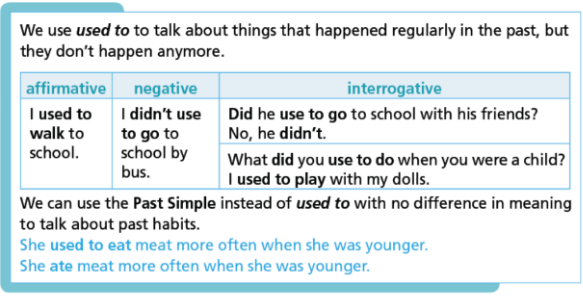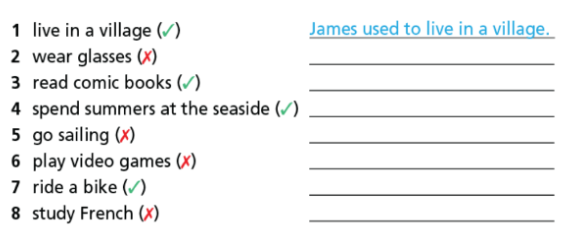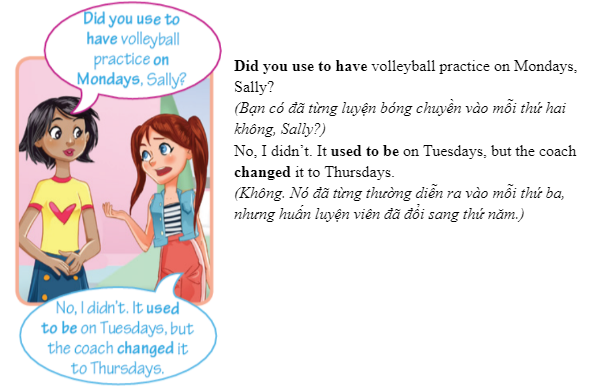Tiếng Anh 7 Unit 2 2e. Grammar1. Choose the correct option. Sometimes, both options are correct. 2. Write what James used to/didn’t use to do when he was six. 3. What did your partner use to do when he/she was six? Ask to find out, then tell the class. 4. Choose the correct option. 5. Fill in each gap with the correct quantifier. 6. Choose the correct option. Then answer the questions about you.
Lựa chọn câu để xem lời giải nhanh hơn
used to  We use used to to talk about things that happened regularly in the past, but they don’t happen anymore. (Chúng ta sử dụng used to để nói về những thứ đã xảy ra một cách thường xuyên trong quá khứ, nhưng lại không còn diễn ra ở hiện tại.)
We can use the Past simple instead of used to with no difference in meaning to talk about past habits. (Chúng ta có thể sử dụng thì quá khứ đơn thay vì sử dụng used to mà không có sự khác biệt về nghĩa để nói về thói quen ở quá khứ.) She used to eat meat more often when she was younger. (Cô ấy đã ăn nhiều thịt hơn khi cô ấy còn trẻ.) She ate meat more often when she was younger. (Cô ấy đã từng ăn nhiều thịt hơn khi cô ấy còn trẻ.) Bài 1 1. Choose the correct option. Sometimes, both options are correct. (Chọn đáp án đúng. Có trường hợp cả hai đáp án đều đúng.) 1. Marko used to go/went snorkelling every summer but now he’s too busy. 2. Mary didn’t use/used to play tennis when she was at college. 3. Jane left/used to leave for the gym an hour ago. 4. Every summer, we used to go/went swimming. 5. Did Jenny use/used to play basketball when she was a kid? 6. The sports centre used to move/moved to a new location. 7. I didn’t use/used to go jogging when I was a kid. 8. My parents used to buy/bought me a new racquet last week. Lời giải chi tiết: 1. Marko used to go/went snorkelling every summer but now he’s too busy. (Marko đã từng đi/ đã đi lặn mỗi mùa hè nhưng giờ anh ấy quá bận.) 2. Mary didn’t use to play tennis when she was at college. (Mary đã từng không chơi tennis khi cô ấy ở trường cao đẳng.) 3. Jane left for the gym an hour ago. (Jane đã rời khỏi để đi tập gym 1 tiếng trước.) 4. Every summer, we used to go/went swimming. (Mỗi mùa hè, chúng tôi đã từng/ đã đi bơi.) 5. Did Jenny use to play basketball when she was a kid? (Jenny có đã từng chơi bóng rổ khi cô ấy còn nhỏ không?) 6. The sports centre moved to a new location. (Trung tâm thể thao thường chuyển tới địa điểm mới.) 7. I didn’t use to go jogging when I was a kid. (Tôi không từng đi chạy bộ khi tôi còn nhỏ.) 8. My parents used to buy me a new racquet last week. (Bố mẹ tôi đã mua cho tôi một chiếc vợt mới tuần trước.) Bài 2 2. Write what James used to/didn’t use to do when he was six. (Viết ra những gì James đã từng/ không từng làm khi anh ấy 6 tuổi.)  Lời giải chi tiết: 1. live in a village (✔) -> James used to live in a village. (James từng sống ở một ngôi làng.) 2. wear glasses (χ) -> James didn’t use to wear glasses. (James đã không từng đeo kính.) 3. read comic books (✔) -> James used to read comic books. (James đã từng đọc truyện tranh.) 4. spend summers at the seaside (✔) -> James used to spend summers at the seaside. (James đã từng dành mỗi mùa hè bên bờ biển.) 5. go sailing (χ) -> James didn’t use to go sailing. (James đã không từng đi thuyền.) 6. play video games (χ) -> James didn’t use to play video games. (James đã không từng chơi điện tử.) 7. ride a bike (✔) -> James used to ride a bike. (James đã từng đi xe đạp.) 8. study French (χ) -> James didn’t use to study French. (James đã không từng học tiếng Pháp.) Bài 3 3. What did your partner use to do when he/she was six? Ask to find out, then tell the class. (Bạn của bạn đã từng làm gì khi anh ấy/cô ấy 6 tuổi? Hỏi để biết, sau đó nói cho cả lớp.) A: Did you use to go to the cinema? (Bạn có đã từng đi đến rạp chiếu phim không?) B: No, I didn’t. I used to watch cartoons on TV. (Không. Tôi đã từng xem phim hoạt hình trên tivi.) Phương pháp giải: - Sử dụng used to để diễn tả thói quen đã xảy ra trong quá khứ. Lời giải chi tiết: A: Did you use to play with toy cars? (Bạn có đã từng chơi ô tô đồ chơi không?) B: No, I didn’t. I used to watch TV. (Không. Tôi thường xem tivi.) A: Did you use to go to ballet lessons? (Bạn có đã từng tới các lớp học múa ba lê không?) B: No, I didn’t. I used to play sports. (Không. Tôi thường chơi thể thao.) Bài 4 4. Choose the correct option. (Chọn phương án đúng.) 1. We’ve got a lot/ many/much/few of cheese. 2. How lot/many/much/a little cucumbers are there in the fridge? 3. There is lots/some/a few/little of rice in the bowl. 4. Is there few/little/lots/any pizza left? 5. There’s too much/too many/a lot/a few sugar in my tea. 6. How many/little/much/few juice is there in the cartoon? 7. There isn’t many/much/little/some coffee in the pot. Lời giải chi tiết: 1. We’ve got a lot of cheese. (Chúng tôi có rất nhiều phô mai) 2. How many cucumbers are there in the fridge? (Có bao nhiêu quả dưa chuột trong tủ lạnh) 3. There is lots of rice in the bowl. (Có rất nhiều cơm trong bát.) 4. Is there any pizza left? (Có còn tí pizza nào không?) 5. There’s too much sugar in my tea. (Có rất nhiều đường trong trà của tôi.) 6. How much juice is there in the cartoon? (Có bao nhiêu nước ép trong thùng các- tông.) 7. There isn’t much coffee in the pot. (Không có nhiều cà phê trong tách.) Bài 5 5. Fill in each gap with the correct quantifier. (Điền vao chỗ trống với lượng từ đúng.) 1. A: How many bananas are there in the fruit bowl? B: Not ______. Just a ______. 2. A: There’s ______ of cheese in the fridge. B: Let’s make ______ cheese sandwiches for dinner, then. 3. A: How ______ chicken do you need for the salad? B: Not ______. Just a ______. 4. A: Don’t give me too ______ potatoes- I’m not very hungry. B: That’s OK. There aren’t ______ anyway. Lời giải chi tiết: 1. A: How many bananas are there in the fruit bowl? (Có bao nhiêu chuối trong bát trái cây?) B: Not many. Just a few. (Không nhiều. Chỉ một ít.) 2. A: There’s a lot/lots of cheese in the fridge. (Có nhiều phô mai trong tủ lạnh.) B: Let’s make some cheese sandwiches for dinner, then. (Hãy làm bánh sandwich phô mai cho bữa tối đi.) 3. A: How much chicken do you need for the salad? (Bạn cần bao nhiêu gà cho salad?) B: Not much. Just a little. (Không nhiều. Chỉ một ít.) 4. A: Don’t give me too many potatoes- I’m not very hungry. (Đừng đưa cho tôi quá nhiều khoai tây. Tôi không đói bụng lắm.) B: That’s OK. There aren’t many anyway. (Được thôi. Dẫu sao cũng không nhiều lắm.) Bài 6 6. Choose the correct option. Then answer the questions about you. (Chọn phương án đúng. Sau đó trả lời các câu hỏi về bạn.) 1. How much/How many milk do you drink every day? 2. Do you drink a lot of/a few water every day? 3. How many/much vegetables do you eat every day? 4. Does your diet contain many/much fruit? 5. Do you eat some/lots of fast food? Lời giải chi tiết: 1. How much milk do you drink every day? (Bạn uống bao nhiêu sữa mỗi ngày?) Trả lời: I don’t drink much milk, just one glass every day. 2. Do you drink a lot of water every day? (Bạn có uống nhiều nước mỗi ngày không?) Trả lời: Yes, i drink a lot of water every day. (Có, tôi uống rất nhiều nước mỗi ngày.) 3. How many vegetables do you eat every day? (Bạn ăn bao nhiêu rau mỗi ngày?) Trả lời: I eat a lot of vegetables every day. (Tôi ăn rất nhiều rau mỗi ngày.) 4. Does your diet contain many fruit? (Chế độ ăn của bạn có nhiều trái cây không?) Trả lời: Yes, I eat a lot of fruit every day. (Có, tôi ăn rất nhiều trái cây mỗi ngày.) 5. Do you eat lots of fast food? (Bạn có ăn nhiều thức ăn nhanh không?) Trả lời: No, I don’t. I don’t eat much fast food. (Không, tôi không ăn quá nhiều thức ăn nhanh.)
|














